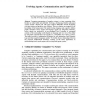133 search results - page 9 / 27 » A new approach to fuzzy goal programming |
AISADM
2005
Springer
14 years 2 months ago
2005
Springer
Computer programming of complex systems is a time consuming effort. Results are often brittle and inflexible. Evolving, self-learning flexible multi-agent systems remain a distant ...
CDC
2009
IEEE
14 years 1 months ago
2009
IEEE
—TD learning and its refinements are powerful tools for approximating the solution to dynamic programming problems. However, the techniques provide the approximate solution only...
HICSS
2010
IEEE
14 years 3 months ago
2010
IEEE
This paper introduces a new architecture for automating the generalization of program structure and the recognition of common patterns in the area of malware analysis. By using ma...
ICLP
2005
Springer
14 years 1 months ago
2005
Springer
Our goal is to study the feasibility of porting termination analysis techniques developed for one programming paradigm to another paradigm. In this paper, we show how to adapt ter...
ATAL
2009
Springer
14 years 3 months ago
2009
Springer
Distributed Constraint Optimization (DCOP) provides a rich framework for modeling multi-agent coordination problems. Existing problem domains for DCOP focus on small (<100 vari...

